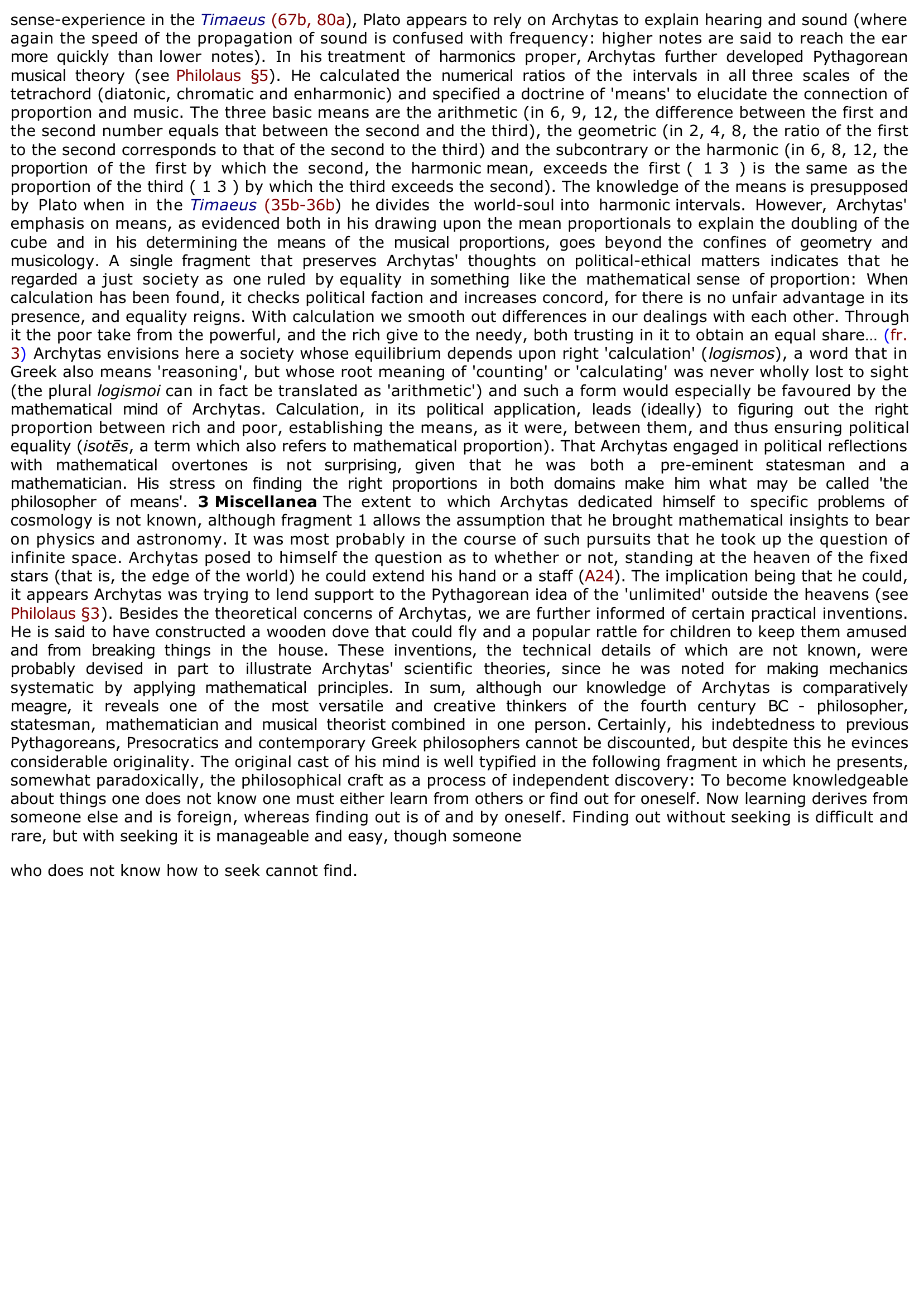Archytas
Publié le 18/01/2010
Extrait du document
Archytas of Tarentum (modern Taranto in southern Italy) was a contemporary and personal acquaintance of Plato, and the last of the famous Pythagoreans in antiquity. An ancient source (Proclus)chytas with those mathematicians 'who increased the number of theorems and progressed towards a more scientific arrangement of them' and ranks him among the predecessors of Euclid. His chief contribution in mathematics was to find a solution for the doubling of the cube. As a Pythagorean philosopher, Archytas gave mathematics universal scope: he viewed the four cardinal branches of Greek scientific knowledge - arithmetic, geometry, astronomy and music - as 'sister sciences' since they could be formulated mathematically. In both mathematics and music he emphasized the study of mean proportionals. He also conducted empirical investigations in acoustics and invented simple technical devices by which to illustrate the application of mathematical principles to mechanics. Archytas was able to combine his philosophical-scientific interests with an active political career; he was a leading statesman of Tarentum and served as a successful general.
«
sense-experience in the Timaeus (67b, 80a ), Plato appears to rely on Archytas to explain hearing and sound (where again the speed of the propagation of sound is confused with frequency: higher notes are said to reach the earmore quickly than lower notes).
In his treatment of harmonics proper, Archytas further developed Pythagoreanmusical theory (see Philolaus §5 ).
He calculated the numerical ratios of the intervals in all three scales of the tetrachord (diatonic, chromatic and enharmonic) and specified a doctrine of 'means' to elucidate the connection ofproportion and music.
The three basic means are the arithmetic (in 6, 9, 12, the difference between the first andthe second number equals that between the second and the third), the geometric (in 2, 4, 8, the ratio of the firstto the second corresponds to that of the second to the third) and the subcontrary or the harmonic (in 6, 8, 12, theproportion of the first by which the second, the harmonic mean, exceeds the first ( 1 3 ) is the same as theproportion of the third ( 1 3 ) by which the third exceeds the second).
The knowledge of the means is presupposedby Plato when in the Timaeus (35b-36b ) he divides the world-soul into harmonic intervals.
However, Archytas' emphasis on means, as evidenced both in his drawing upon the mean proportionals to explain the doubling of thecube and in his determining the means of the musical proportions, goes beyond the confines of geometry andmusicology.
A single fragment that preserves Archytas' thoughts on political-ethical matters indicates that heregarded a just society as one ruled by equality in something like the mathematical sense of proportion: Whencalculation has been found, it checks political faction and increases concord, for there is no unfair advantage in itspresence, and equality reigns.
With calculation we smooth out differences in our dealings with each other.
Throughit the poor take from the powerful, and the rich give to the needy, both trusting in it to obtain an equal share… (fr. 3) Archytas envisions here a society whose equilibrium depends upon right 'calculation' ( logismos ), a word that in Greek also means 'reasoning', but whose root meaning of 'counting' or 'calculating' was never wholly lost to sight(the plural logismoi can in fact be translated as 'arithmetic') and such a form would especially be favoured by the mathematical mind of Archytas.
Calculation, in its political application, leads (ideally) to figuring out the rightproportion between rich and poor, establishing the means, as it were, between them, and thus ensuring politicalequality ( isotēs , a term which also refers to mathematical proportion).
That Archytas engaged in political reflections with mathematical overtones is not surprising, given that he was both a pre-eminent statesman and amathematician.
His stress on finding the right proportions in both domains make him what may be called 'thephilosopher of means'.
3 Miscellanea The extent to which Archytas dedicated himself to specific problems of cosmology is not known, although fragment 1 allows the assumption that he brought mathematical insights to bearon physics and astronomy.
It was most probably in the course of such pursuits that he took up the question ofinfinite space.
Archytas posed to himself the question as to whether or not, standing at the heaven of the fixedstars (that is, the edge of the world) he could extend his hand or a staff ( A24 ).
The implication being that he could, it appears Archytas was trying to lend support to the Pythagorean idea of the 'unlimited' outside the heavens (seePhilolaus §3 ).
Besides the theoretical concerns of Archytas, we are further informed of certain practical inventions. He is said to have constructed a wooden dove that could fly and a popular rattle for children to keep them amusedand from breaking things in the house.
These inventions, the technical details of which are not known, wereprobably devised in part to illustrate Archytas' scientific theories, since he was noted for making mechanicssystematic by applying mathematical principles.
In sum, although our knowledge of Archytas is comparativelymeagre, it reveals one of the most versatile and creative thinkers of the fourth century BC - philosopher,statesman, mathematician and musical theorist combined in one person.
Certainly, his indebtedness to previousPythagoreans, Presocratics and contemporary Greek philosophers cannot be discounted, but despite this he evincesconsiderable originality.
The original cast of his mind is well typified in the following fragment in which he presents,somewhat paradoxically, the philosophical craft as a process of independent discovery: To become knowledgeableabout things one does not know one must either learn from others or find out for oneself.
Now learning derives fromsomeone else and is foreign, whereas finding out is of and by oneself.
Finding out without seeking is difficult andrare, but with seeking it is manageable and easy, though someone
who does not know how to seek cannot find..
»
↓↓↓ APERÇU DU DOCUMENT ↓↓↓

































